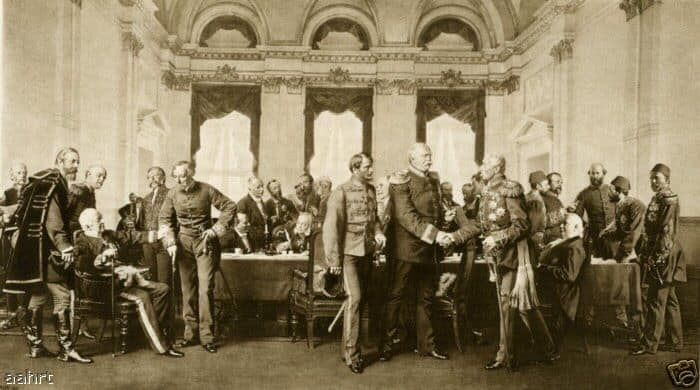European interests in Africa began as early as the 1st century Ad.
The Greeks, Romans, Portuguese, British, French and the Dutch traded with the Africans.
It led to development of trade routes and centres which opened up Africa.
The interaction with Africans changed between 1884 and 1914 when the Europeans started to invade and colonise Africa.
Scramble and Partition for Africa
To scramble means to rush for, compete or struggle with others in order to get something.Partition means to divide something among people or competitors.
The scramble and partition of Africa refers to the rush for European powers to establish their spheres of influence or colonies in Africa.
Methods used by European to acquire Colonies in Africa
- Signing of Treaties: Europeans used to sign treaties with the local leaders and also among themselves.
- Military Conquest: This approach was used whenever treaty making failed.
- Diplomacy: This was a method characterized by Europeans use of peaceful negotiations to acquire territory.
- Trickery: This involved luring African leaders with gifts to surrender their territory to Europeans.
- Company rule: This was the use of chartered companies to administer the colonies on behalf of the European powers.
- Missionaries: This is when missionaries asked for protection from their parent countries after converting Africans to Christianity.
Process of Partition
This process involved dividing Africa among European powers after the Berlin conference of 1884-85.
Leaders at the Berlin Conference
The following terms were agreed upon during the conference.
- Missionaries, traders and explorers irrespective of their countries of origin should be protected by the colonial powers.
- Any power owning territory in Africa must undertake to abolish slave trade.
- River Niger and Congo must be left free for all European powers for fair trade.
- Partition treaties must be used to sort out any future disagreements.
- Once an area is declared a sphere of influence effective occupation must be established.
- Any European power claiming any part of Africa must inform other powers.
Impact of Partition
The partition of Africa had several effects both to both Africans and Europeans as follows;- Drawing of boundaries in Africa
- Spread of Christianity
- Introduction of Western education
- Abolition of slave trade
- Improvement in agriculture
- Some communities were split into different countries
African Reaction to European Colonization
There was resistance from across different parts in the continent by various groups of people.Other groups collaborated with the Europeans in this partition exercise.
Resistance refers to the use weapons by Africans to fight the foreigners.
Collaboration means getting into a cooperation, association or partnership with another person, party or group.
The Mandika Resistance
This was the resistance by the Mandinka people led by Samouri Toure.There are several reasons that led to the resistance as follows;
- To safeguard their independence
- Samouri Toure was unwilling to lose the Bure Gold mines to the French
- Samouri wanted to maintain economic and military supremacy
- Samouri was against the introduction of Christianity to his Muslim subjects
- The French supplied weapons to his enemy Tieba of Sikasso
Some of the reasons he was able to resist the French for a long time include;
- He used the guerilla tactics in fighting the French and he knew his terrain well.
- He was a soldier and had a large army that was well equipped with modern weapons.
- He had a workshop where he made and repaired his weapons.
The reasons why they managed to defeat him include;
- Lack of adequate supplies.
- Lack of unity among African societies.
- Samouri's second empire was open to attacks.
- The British refused to support Samouri against the French.
- The French had superior weapons.
- The weapon become demoralized due to continuous warfare.
- Loss of independence
- Loss of lives
- Destruction of property
- Displacement of people
- Samouri was deported to Gabon where he died
The Lewanika's Collaboration
Lewanika, the leader of Lozi, entered into a partnership with the British unlike Samoure Toure who resisted the French.The reasons for his collaboration included;
- Lewanika needed British cooperation so as to quash a succession dispute to the throne that was threatened by his half-brother Mwanawina.
- External attacks in the form of Ndebele cattle raids.
- The Portuguese were raiding the Lozi for slaves with sophisticated weapons.
- Lewanika was impressed by the benefits that Chief Khama of the Ngwato in Botswana obtained from cooperating with the British.
- Lewanika admired the western way of life and his thinking was influenced by his secretary who was also a French missionary, Francois Coillard.
- Lewanika was aware of the British military supremacy.
- The Ware Treaty of 1889 that allowed the British to prospect for minerals.
- The Lochner Treaty of 1890 which gave the British exclusive mining rights in all areas of Balotse except for certain traditional iron mines.
- The Lawley Treaty of 1898 which allowed British settler farming in Balotseland.
- The Coryndon Treaty of 1900 that gave the British judicial and administrative powers, and as a result, Lewanika become a paramount chief and an employee in the British administration, and therefore no longer an independent king.
- Lewanika retained his position as paramount chief of the Lozi.
- The British used Lozi to establish their authority over Northern Rhodesia.
- Lozi chiefs lost all their powers except that of tax collection.
- The British South Africa company exploited minerals in Borotseland.
- The British built schools, hospitals, transport and communication links on Borotseland.
